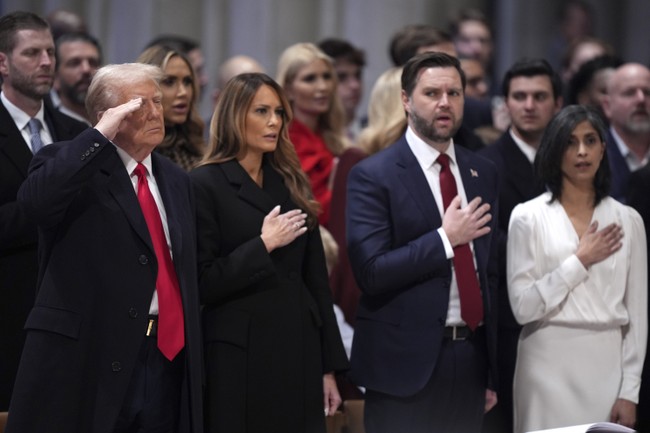Mariann Budde, the bishop in question, used her platform to discuss topics such as transgender children and the fears that some individuals harbor under the Trump administration. She implored the president to show compassion to those anxious about his leadership, including individuals who contribute to society in various ways, even if they are undocumented. Her words painted a picture of a nation divided by fear and uncertainty.
Budde’s plea to President Trump was laden with references to various communities, including those identifying as gay, lesbian, and transgender, as well as families across the political spectrum who feel threatened. Her approach, however, struck a discordant note with those who expected a focus on spiritual guidance rather than political rhetoric.
The Episcopalian Church, in recent years, has been known for its progressive stance on several issues. This shift has seen some of its clergy, like Budde, advocate for what they perceive as social justice, often aligning with left-wing ideologies. Critics argue that such positions stray far from traditional Christian teachings, transforming the church into a platform for political expression rather than religious instruction.
Budde’s address also included remarks on immigrants, suggesting that they play vital roles in the economy, from agriculture to food service, despite lacking proper documentation. Her portrayal of immigrants was meant to evoke empathy, highlighting their contributions and urging for mercy in immigration policies.
However, the assumption that immigrants primarily engage in low-skilled labor sparked criticism. Some argue that reducing entire communities to such roles is not only inaccurate but also patronizing. It’s essential to recognize the diverse talents and contributions of immigrants beyond the stereotypes often perpetuated.
Attendees like JD Vance displayed visible discomfort during Budde’s speech, reflecting the sentiment of many who felt her address was misplaced.
JD’s face at the woke sermon says it all pic.twitter.com/UJfQybj9Ft
— End Wokeness (@EndWokeness) January 21, 2025
President Trump, known for his straightforwardness, was characteristically unreserved in his response, dismissing the sermon as political grandstanding.
Trump responds to the sermon at the National Prayer Service, that asked him to take “mercy” on those “scared” of his presidency.
“Not too exciting, was it.”
“They could do much better,” Trump says. https://t.co/Zgvb1l5ICq pic.twitter.com/50QanxBNFc
— Reagan Reese (@reaganreese_) January 21, 2025
The prayer service, intended as a moment of unity and reflection, instead highlighted the ongoing cultural and political divides in the country. Budde’s remarks, while deeply felt by some, were perceived by others as a departure from the core message of Christianity.
The Gospel, as understood by many, is a message of salvation and transformation, not a vehicle for advancing political agendas. The call for compassion and mercy is a personal one, not necessarily a directive to contravene established laws or societal norms.
Budde’s sermon serves as a reminder of the complex interplay between faith and politics in contemporary society. While her intentions may have been to promote understanding and empathy, the execution left room for divisive interpretations.
The reactions to her speech underscore the challenges faced by religious leaders when navigating the intersection of spiritual and political discourse. For some, the pulpit is a place for spiritual guidance, not political advocacy.
This event has sparked conversations about the role of religious institutions in political matters, and whether they should engage in such debates or focus solely on spiritual teachings. The divergent opinions reflect the broader national conversation about the place of religion in public life.
As the country moves forward, the balance between faith and politics will continue to be a topic of discussion. Leaders like Budde will likely remain in the spotlight as they navigate their roles in a rapidly changing societal landscape.
The reaction to Budde’s speech at the National Cathedral serves as a microcosm of the broader cultural clashes occurring across the nation. While some may welcome the integration of faith and social issues, others see it as a deviation from the church’s primary mission.
The future of the Episcopalian Church and others like it may hinge on their ability to reconcile these differences, providing a space for both spiritual growth and meaningful social engagement without alienating believers.




2 Comments
Religion and politics, never a good idea, especially if they don’t know what they are talking about.
That is no Christian teacher and far from an elder or authority of any Church under Jesus Christ! That woman is a political activist, Marxist, Leftist and Satanic following witch! Stay away from her and that Fraud Church that is just what the book of Revelation refers to in End Time! The Presbyterian Church has done the same thing and it even has so called leaders of that church saying abortion is fine and advocating it! These are absolutely wolves in sheep’s clothing that serve Satan!